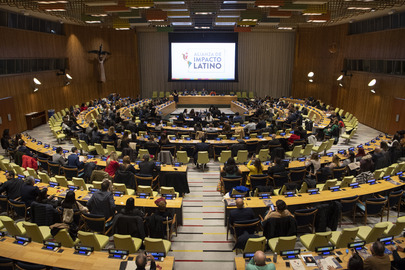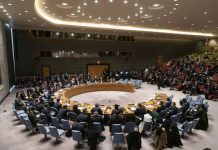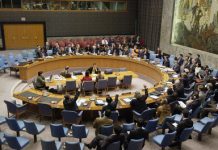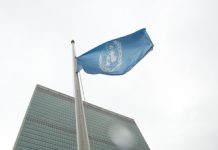Myanmar quake: Airstrikes continue despite ceasefire
Myanmar’s military has continued to launch airstrikes and other attacks against opposition forces in the devastated country, one week since a 7.7 magnitude earthquake struck and despite agreeing to a ceasefire, UN human rights chief Volker Türk said on Friday.
His Office said that the Myanmar military had launched some attacks “shortly after tremors subsided”. Tactics have included using motorized hang-gliders to drop bombs, said James Rodehaver, head of the UN human rights office for Myanmar:
“Essentially what those are is an individual military operative who uses a hang-glider with a backpack attached to his back or to his torso with a large fan on it and he uses that to essentially paraglide using the fan as a motor over areas and drop hand-held bombs or munitions onto targets below.”
Latest data from the UN human rights office, OHCHR, points to dozens of reported attacks across Myanmar since the disaster happened. Many have happened since the ceasefire announced by the military was supposed to take effect on 2 April.
According to the UN refugee agency, UNHCR, 80 per cent of structures in Myanmar’s second city of Mandalay are estimated to have collapsed. It has issued a $16 million funding request ?? to support 1.2 million survivors.
Sudanese suffering continues amid massive destruction across Khartoum
The people of Sudan are trapped in siege-like conditions from which they have little chance of escaping, facing the constant threat of unspeakable abuse.
Many have simply run out of hope.
That’s according to Mohamed Refaat, Chief of Mission in Sudan for the UN International Organization for Migration.
He’s been speaking to reporters in Geneva, after returning from previously inaccessible Khartoum state, which is now back under the control of the Sudanese army having been held by the rival Rapid Support Forces paramilitaries.
Mr. Refaat, a veteran aid worker, said that even he was shocked by the level of destruction in the Sudanese capital:
“Electricity stations have been looted, the water pipes have been destroyed. And I’m not talking about some areas, I’m talking about everywhere I went. I have been in wars in Libya, Yemen, many other conflict areas and the level of destruction I have seen in Bahri, Khartoum, is unimaginable. There has been targeting of not only people’s houses, but administrative areas, not military areas, but all the basic infrastructure that can maintain lives for people.”
Massive re-investment is needed to help all those returning to the Sudanese capital, after nearly two years of war.
Mr. Refaat described meeting Sarah, an elderly maths teacher, unable to flee the violence. Her days had been “filled with horror”, he said, witnessing the loss of loved ones, seeing homes destroyed and being surrounded by the permanent threat of violence and sexual abuse.
In the absence of funding, many non-governmental organizations have stopped their work. There are many more people like Sarah who have received no assistance, Mr. Refaat insisted.
Cholera is surging globally, warns UN health agency
The global surge in cholera is threatening vulnerable people from Myanmar to Angola and from the Democratic Republic of the Congo to Sudan, fuelled by conflict, natural disasters and climate change, the World Health Organization (WHO) said on Friday.
The UN health agency registered almost 810,000 cases and 5,900 deaths from the preventable disease in 2024; that’s about 50 per cent higher than the previous year, according to Dr Philippe Barboza, who leads WHO’s cholera team.
He said the latest reported cases are almost certainly underestimates and that the disease continues to affect countries that were previously cholera-free.
Recent cuts to international aid funding are also hindering the response, Dr Barboza said:
“We estimate that based on the example, in Malawi or in Zambia last year or the year before that, $6 million immediately would allow us to implement full control of the outbreak. But this amount of money is not available. So, this is a very major concern in the way that not only the outbreaks are getting worse and worse, deadlier and deadlier, but the funds are getting smaller and smaller to control this outbreak.”
WHO data indicates that Namibia reported infections this year after a 10-year break, while Kenya, Malawi, Zambia and Zimbabwe are also experiencing a resurgence.
Angola has also reported nearly 10,000 cholera infections so far this year and 380 people have died from the disease there in the last three months alone.
Daniel Johnson, UN News
Music composed and produced by Joachim Harris. All rights reserved
Source of original article: United Nations (news.un.org). Photo credit: UN. The content of this article does not necessarily reflect the views or opinion of Global Diaspora News (www.globaldiasporanews.com).
To submit your press release: (https://www.globaldiasporanews.com/pr).
To advertise on Global Diaspora News: (www.globaldiasporanews.com/ads).
Sign up to Global Diaspora News newsletter (https://www.globaldiasporanews.com/newsletter/) to start receiving updates and opportunities directly in your email inbox for free.
































